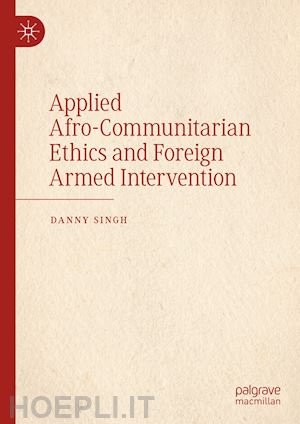

Questo prodotto usufruisce delle SPEDIZIONI GRATIS
selezionando l'opzione Corriere Veloce in fase di ordine.
Pagabile anche con Carta della cultura giovani e del merito, Carta della Cultura e Carta del Docente
Just war theory concerns the morality of engaging in warfare, the conduct in war and justice – including democratization and reconstruction – in the aftermath to end war. The morality of war can be measured from a variety of military and philosophical ethics that include theological, consequentialist and realist schools of thought. Various military interventions, such as Bosnia, Afghanistan and Iraq, have been analyzed and evaluated and criticized from a Western and, especially, liberal point of view.
In this book, Danny Singh addresses foreign interventions from a different normative paradigm. Namely, he addresses the morality of foreign military interventions in light of Afro-communitarianism, a dominant philosophical approach in sub-Saharan Africa. According to Afro-communitarianism, positive communal relationships/social harmony are the greatest good that can be achieved to form friendship (which can be understood as the combination of shared identity and goodwill). Even though Afro-communitarianism prioritizes peaceful communal relations, enmity-behavior and violence are morally permissible if it either leads to a less disharmonious state of affairs or to a harmonious state of affairs or there are no friendly alternatives to achieve any of both desired outcomes but the initiator of conflict desires to promote them. Moreover, Afro-communitarianism prescribes dialogue as a guiding action to avoid military conflict. The book provides an alternative, and non-Western, approach to the morality of war and efforts to promote sustainable peace in the aftermath of conflict between warring belligerent parties.
Introduction. - Chapter I. Principles of Afro-communitarianism and permissible violence.- Chapter II. Rwanda, the United Nations and intervention.- Chapter III. The United Nations and Britain in Sierra Leone.- Chapter IV. The Afghan invasion and fight against terrorism.- Chapter V. United States and allied unilateral intervention in Iraq.- Chapter VI. African-led military interventions.- Chapter VII. Implications of non-interventions in Nigeria, the Niger Delta and Syria.- Chapter VIII. Conclusions.
Danny Singh is Senior Lecturer in Politics and International Relations at Teesside University, UK.











Il sito utilizza cookie ed altri strumenti di tracciamento che raccolgono informazioni dal dispositivo dell’utente. Oltre ai cookie tecnici ed analitici aggregati, strettamente necessari per il funzionamento di questo sito web, previo consenso dell’utente possono essere installati cookie di profilazione e marketing e cookie dei social media. Cliccando su “Accetto tutti i cookie” saranno attivate tutte le categorie di cookie. Per accettare solo deterninate categorie di cookie, cliccare invece su “Impostazioni cookie”. Chiudendo il banner o continuando a navigare saranno installati solo cookie tecnici. Per maggiori dettagli, consultare la Cookie Policy.